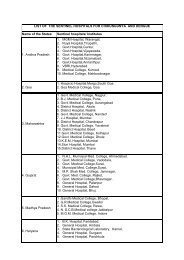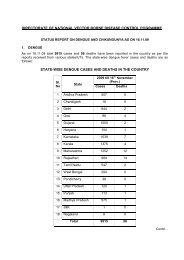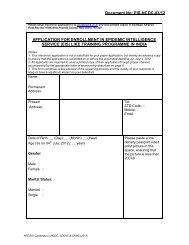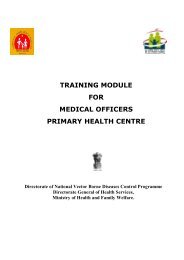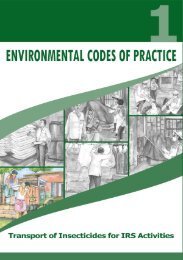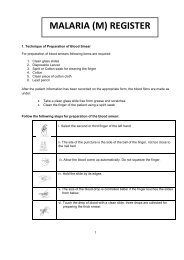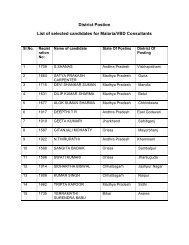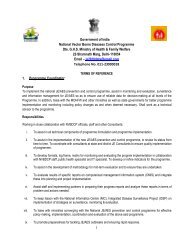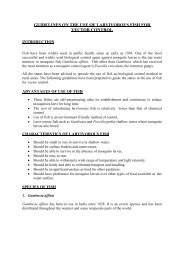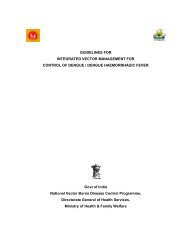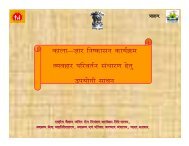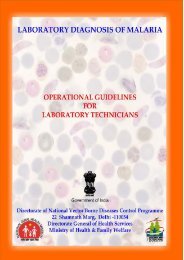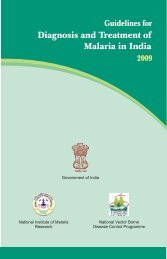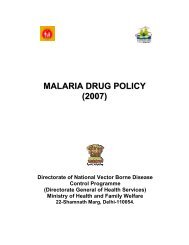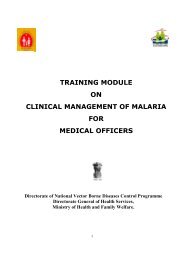National Project Implementation Plan - NVBDCP
National Project Implementation Plan - NVBDCP
National Project Implementation Plan - NVBDCP
Create successful ePaper yourself
Turn your PDF publications into a flip-book with our unique Google optimized e-Paper software.
<strong>Project</strong> Steering Committee: A steering committee is being proposed to ensure<br />
that there is regular review, discussion and action on project implementation<br />
involving both the central and the state levels. In several projects, often actions<br />
required at the central level get delayed, e.g., important procurement, and the<br />
states watch helplessly while implementation suffers. Similarly often the states<br />
do not have clarity on some project activities and neglect their implementation.<br />
The <strong>Project</strong> Steering Committee will be chaired by the Joint Secretary, MOHFW,<br />
representative from NRHM and have the following members: Director; Joint<br />
Director, Deputy Director malaria and Deputy Director, kala-azar from the<br />
<strong>NVBDCP</strong>; Regional Directors for the concerned states; and Programme Officers,<br />
<strong>NVBDCP</strong> from the five states of Andhra Pradesh, Chhattisgarh, Jharkhand,<br />
Madhya Pradesh and Orissa. WHO, GFATM, the World Bank and IDA will<br />
participate in the meetings as observers. The Steering Committee will meet<br />
quarterly to discuss specific agenda to be circulated two weeks in advance;<br />
similarly minutes of the meetings will be prepared and circulated within two<br />
weeks after the meeting. The Steering Committee will help keeping project<br />
implementation on track by reviewing and ensuring that all key actions, at<br />
central and state levels, get taken and any constraints that impede progress are<br />
addressed. It will also provide policy support and administrative approvals for<br />
state plans and for key program decisions. The Joint Secretary will have overall<br />
coordination responsibility in the MOHFW, to be supported by Director level<br />
Officer, MOH; Joint Director, <strong>NVBDCP</strong> will be the Member Secretary of the <strong>Project</strong><br />
Steering Committee.<br />
<strong>NVBDCP</strong> is being strengthened for implementation of this project by (i) GFTAM<br />
providing consultants and support staff for malaria control; WHO providing six<br />
consultants to address kala-azar; and the project itself supporting ten<br />
consultants at the central level and over 100 staff/consultants in procurement,<br />
financial management, environment, training, supervision, etc. at the state,<br />
district and sub-district levels. These consultants will be in position in time for<br />
startup in the initial project districts and for other districts at the time of review<br />
of the districts readiness criteria. <strong>NVBDCP</strong> will also contract with national NGO’s<br />
and other technical agencies to strengthen capacities for supporting<br />
decentralized programming, community monitoring, and other implementation<br />
needs.<br />
Regional-level: The MOHFW’s 17 Regional Offices for Health and Family Welfare,<br />
located in 17 States, will also play a role in project implementation. These<br />
regional offices support the <strong>NVBDCP</strong>. They conduct entomological studies in<br />
collaboration with the States, drug resistance studies, cross-checking of blood<br />
slides for quality control, capacity building at the state level, and monitoring and<br />
supervision. The <strong>National</strong> Institute for Malaria Research under the Indian Council<br />
for Medical Research has field stations in 9 States and supports the malaria<br />
control program through operational and applied field studies.<br />
103



